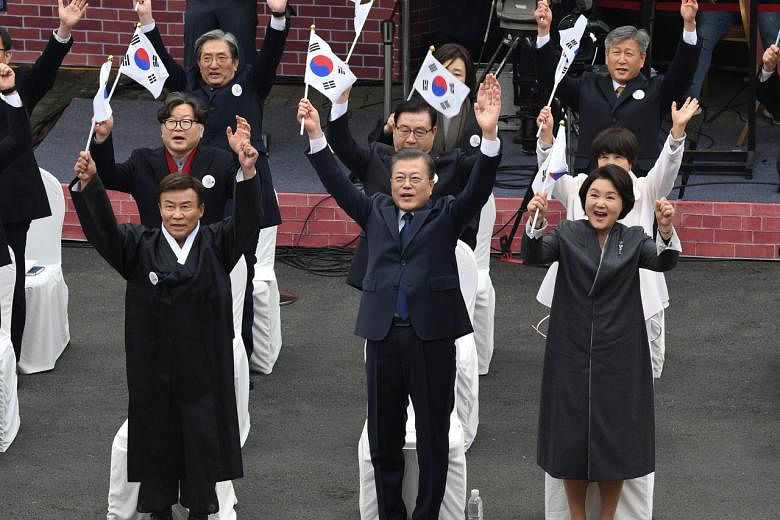TOKYO (THE YOMIURI SHIMBUN/ASIA NEWS NETWORK) - Japan and South Korea, as neighbours, need to cooperate in dealing with pressing issues without being preoccupied with historical issues between the two countries.
The prevention of the spread of the new coronavirus could be a symbolic case.
South Korean President Moon Jae-in, in a speech at a ceremony to mark the Mar 1 Independence Movement against Japanese colonial rule, called on Japan to make joint efforts to overcome a crisis and establish a future-oriented cooperative relationship, apparently referring to the ongoing spread of the infection in the two countries.
The speech focused on easing public anxiety over the new strain of the pneumonia-causing virus, rather than on historical issues between the two nations.
He stressed the importance of cooperating with China and Japan, saying that cross-border threats such as the spread of this infectious disease are increasing. This is a natural acknowledgement.
In South Korea, the spread of the infection has become a serious situation as more than 5,000 people have been infected, mainly in the southeastern part of the country.
Keeping in mind reflections on the outbreak of Middle East Respiratory Syndrome (Mers) in the country in 2015, the South Korean government has improved its system and is conducting tests on more than 10,000 people per day.
There are many unknowns about the new coronavirus. It would be beneficial for Japan and South Korea to exchange information on the spread of the illness and its development.
Japan, South Korea and China regularly hold health ministers' meetings to discuss measures against infectious diseases.
A joint action plan compiled in 2016 stipulates that when something like a new strain of influenza or an infectious disease occurs, the country where the disease breaks out will promptly provide the other two countries with information on its epidemiological and clinical characteristics and infection prevention measures.
China, where the outbreak was first confirmed, has been criticised for its delay in disclosing information and taking early steps. Japan and South Korea must strongly urge China to thoroughly share information and closely cooperate in dealing with the issue.
There are many other areas in which practical cooperation between Japan and South Korea is effective, such as the environment.
South Korea should stop its tendency of cooling the entire Japan-South Korea relationship by rehashing historical issues.
Japan and South Korea have been at loggerheads over the issue of "former requisitioned workers" from the Korean Peninsula.
Mr Moon should show concrete solutions for eliminating obstacles to cooperation between the two countries.
In his speech, Mr Moon reiterated his willingness to resume exchanges with North Korea. He described as a "historic feat" an agreement in the military domain, including a cessation of all hostile acts, which was reached by South Korea and North Korea in 2018.
The following day, North Korea fired projectiles that appeared to be short-range ballistic missiles. It is unavoidable to say that Moon lacks awareness of the threat.
The United States and South Korea postponed joint military drills due to the spread of the infection. Consideration must be given to not reducing deterrence.
The Yomiuri Shimbun is a member of The Straits Times media partner Asia News Network, an alliance of 24 news media organisations.











